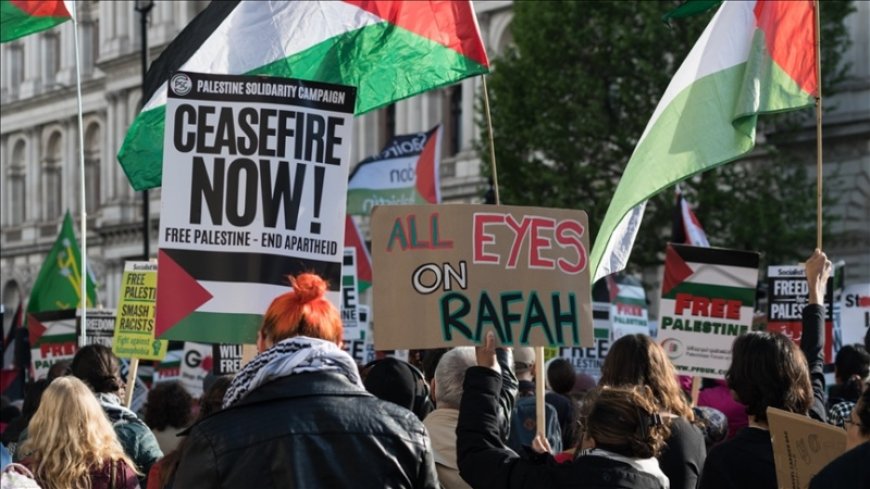Israeli regime :The red line of human rights

For eighty years, the Zionist regime has been massacring the Palestinian nation with the help of its Western and European allies. In the last eight months, global public opinion has witnessed the Zionist regime committing the worst and most violent massacres in Gaza, marking a dark moment in humanity. One of the most heinous crimes during this time was the massacre in Rafah, a result of terrorism supported by Western and European countries. Despite claiming to not support Israel's attack on Rafah, these countries were complicit in the massacre. The Israeli regime not only attacked Rafah but also committed atrocities there. Therefore, countries supporting Israel are complicit in these crimes, despite claiming to uphold human rights. These rights have been violated for years in the occupied territories by the fake Israeli regime.
The Netanyahu government and its supporters often view the killing of civilians as a proportionate or acceptable cost of ousting Hamas commanders. Despite strong criticism from international institutions and legal authorities, this justification is often seen as self-defense by Israel's supporters.
This time in Rafah, Netanyahu justified the human tragedy by announcing the deaths of two Hamas commanders. He attributed the deaths of over 40 civilians in the attack on the Palestinian refugee camp to a technical error.[1]
The Europeans' reaction to the attack by the child-killing and criminal Israeli regime on Rafah was dramatic and desperate. Josep Borrell, the head of the European Union's foreign policy, emphasized, "What happened forces us to realize the necessity of implementing the decision of the International Court of Justice to confirm the immediate cessation of war."[2]
The German Foreign Ministry strongly criticized the attack and emphasized that the images of burnt bodies are unbearable. It appears that European pressure against Israel is growing. In this context, the Belgian Foreign Minister, "Hajjah Lahabib", viewed the decision to establish the Israel-EU Cooperation Council as a significant signal. "Hajjah Lahabib", whose government is known for its strong support of the Palestinians, also stated, "We must ensure that our laws and values are respected by all, especially by our partners such as Israel."
The European Union is the primary trading partner of the Israeli government, and the two parties have extensive economic relations. As a result, this bloc possesses a potent tool to exert pressure on Netanyahu's war cabinet in order to prevent the crimes committed by the Israeli government. However, despite the strong backing of human rights organizations, the European Union has not yet been able to garner political support from all member states for such action.[3]
Meanwhile, the European Union considers human rights to be one of its fundamental principles when establishing relations with other countries across various fields. In agreements made between the European Union and other nations, a clause focusing on human rights is consistently included. This clause dictates that the European Union is obligated to condition the establishment of relations with other countries on their adherence to human rights standards.
Despite the European Union's emphasis on upholding human rights and its promotion of human rights as the core ideology of the union, which includes factors such as democracy, the rule of law, and human rights, there have been contradictions in its actions. This has been evident in the conflicting and double standards[4] displayed by the union in response to human rights violations committed by the Zionist regime.
In the United States, the reactions of official authorities, such as the European Union, were seen as a mere show and media propaganda. Some government officials and representatives of the US Congress took a stance against this action. This is in spite of the fact that prior to the attack on Rafah, Biden stated in an interview with CNN that: "If they go to Rafah, I will not provide them with weapons." Following this interview, many interpreted the words of the American president as him no longer being deceived by Netanyahu. However, after Israeli soldiers entered Rafah and refused to enter the city center, Biden declared that they had not crossed Washington's red lines.
At the outset of the attack on Rafah, Israeli forces took control of the border crossing, cutting off a crucial transportation point to Egypt and hindering aid delivery and evacuation efforts for the wounded. Israeli attacks have persisted daily since then, but it wasn't until Monday, May 27, that the White House acknowledged the severity of the situation. That day, the Zionist regime carried out one of its deadliest assaults on the city, resulting in heart-wrenching images of burnt and mutilated bodies, including those of Palestinian infants. This highlights American complicity in the regime's recent atrocities, as well as its past offenses.
It is clear that the rhetoric of those responsible for heinous acts like
the Rafah massacre no longer resonates with the international community or global public opinion. Over the past eight months, citizens and civil society organizations in Europe and America have come to realize that their governments support and enable Israeli terrorism. This sentiment has been expressed through widespread protests and demonstrations in European countries and various states in America.
[1] https://www.cafediplomat.ir/?p=83300
[2] https://tinyurl.com/y55r2kfx
[3] https://jahankhabari.ir/2024/05/28 /
[4] Ahmad Azizi and Majid Abbasi. "Human Rights Policy of the European Union: A Comparative Study of the Islamic Republic of Iran and Saudi Arabia." Foreign Policy Quarterly, Year 32, Number 2, Summer 2017.













































